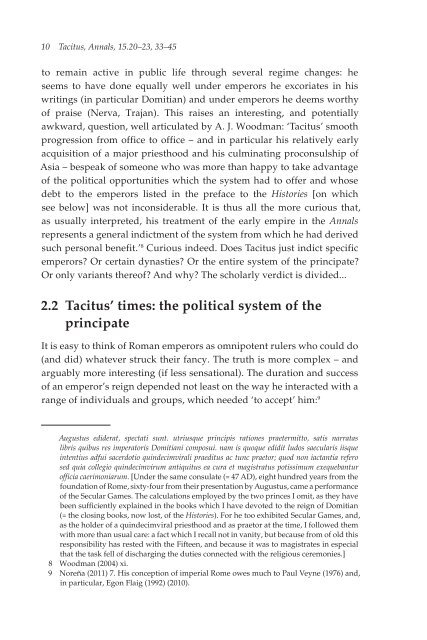Tacitus, Annals, 15.20-23, 33-45. Latin Text, Study Aids with Vocabulary, and Commentary, 2013a
Tacitus, Annals, 15.20-23, 33-45. Latin Text, Study Aids with Vocabulary, and Commentary, 2013a
Tacitus, Annals, 15.20-23, 33-45. Latin Text, Study Aids with Vocabulary, and Commentary, 2013a
You also want an ePaper? Increase the reach of your titles
YUMPU automatically turns print PDFs into web optimized ePapers that Google loves.
to remain active in public life through several regime changes: he<br />
seems to have done equally well under emperors he excoriates in his<br />
writings (in particular Domitian) <strong>and</strong> under emperors he deems worthy<br />
of praise (Nerva, Trajan). This raises an interesting, <strong>and</strong> potentially<br />
awkward, question, well articulated by A. J. Woodman: ‘<strong>Tacitus</strong>’ smooth<br />
progression from office to office – <strong>and</strong> in particular his relatively early<br />
acquisition of a major priesthood <strong>and</strong> his culminating proconsulship of<br />
Asia – bespeak of someone who was more than happy to take advantage<br />
of the political opportunities which the system had to offer <strong>and</strong> whose<br />
debt to the emperors listed in the preface to the Histories [on which<br />
see below] was not inconsiderable. It is thus all the more curious that,<br />
as usually interpreted, his treatment of the early empire in the <strong>Annals</strong><br />
represents a general indictment of the system from which he had derived<br />
such personal benefit.’ 8 Curious indeed. Does <strong>Tacitus</strong> just indict specific<br />
emperors? Or certain dynasties? Or the entire system of the principate?<br />
Or only variants thereof? And why? The scholarly verdict is divided...<br />
<br />
principate<br />
It is easy to think of Roman emperors as omnipotent rulers who could do<br />
(<strong>and</strong> did) whatever struck their fancy. The truth is more complex – <strong>and</strong><br />
arguably more interesting (if less sensational). The duration <strong>and</strong> success<br />
of an emperor’s reign depended not least on the way he interacted <strong>with</strong> a<br />
range of individuals <strong>and</strong> groups, which needed ‘to accept’ him: 9<br />
Augustus ediderat, spectati sunt. utriusque principis rationes praetermitto, satis narratas<br />
libris quibus res imperatoris Domitiani composui. nam is quoque edidit ludos saecularis iisque<br />
intentius adfui sacerdotio quindecimvirali praeditus ac tunc praetor; quod non iactantia refero<br />
sed quia collegio quindecimvirum antiquitus ea cura et magistratus potissimum exequebantur<br />
officia caerimoniarum. [Under the same consulate (= 47 AD), eight hundred years from the<br />
foundation of Rome, sixty-four from their presentation by Augustus, came a performance<br />
of the Secular Games. The calculations employed by the two princes I omit, as they have<br />
been sufficiently explained in the books which I have devoted to the reign of Domitian<br />
(= the closing books, now lost, of the Histories). For he too exhibited Secular Games, <strong>and</strong>,<br />
as the holder of a quindecimviral priesthood <strong>and</strong> as praetor at the time, I followed them<br />
<strong>with</strong> more than usual care: a fact which I recall not in vanity, but because from of old this<br />
responsibility has rested <strong>with</strong> the Fifteen, <strong>and</strong> because it was to magistrates in especial<br />
that the task fell of discharging the duties connected <strong>with</strong> the religious ceremonies.]<br />
8 Woodman (2004) xi.<br />
9 Noreña (2011) 7. His conception of imperial Rome owes much to Paul Veyne (1976) <strong>and</strong>,<br />
in particular, Egon Flaig (1992) (2010).


















